Fitch Ratings has maintained Nigeria’s long-term foreign currency credit default outlook at B-, attributing the stable outlook to recent policies enacted by President Tinubu. However, concerns have arisen regarding the proposed $10 billion forex loan aimed at addressing forex backlogs and enhancing liquidity within the system, as outlined in the latest rating outlook commentary on the Nigerian economy by the global credit ratings agency. Notably, Fitch recognized reforms like fuel subsidy removal and the new exchange rate framework as contributing to the stable outlook.
Nevertheless, it expressed apprehensions about potential backtracking on reforms, pointing to a reduced level of price discovery in the FX market compared to late June and revelations from the nation’s central bank suggesting that foreign reserves are considerably lower than publicly disclosed.
Strengths and weaknesses influencing the current rating:
Fitch highlighted that Nigeria’s ‘B-‘ rating benefits from a substantial economy, a well-established and liquid domestic debt market, and significant oil and gas reserves. However, the rating faces constraints in the form of weak governance, a structurally low non-oil revenue base, heavy reliance on hydrocarbons, security challenges, elevated inflation, limited net foreign exchange reserves, and ongoing vulnerabilities in the exchange-rate framework.

Fitch raised concerns about the recent government announcement to secure $10 billion in foreign exchange, particularly the lack of specific information, such as whether this amount includes World Bank budget support loans totaling $1.5 billion. The agency’s outlook indicated, “We forecast a broadly flat current account surplus, averaging 0.5% of GDP in 2023-2024. There is a lack of detail on a recent government announcement to raise USD10 billion of FX, including whether this includes World Bank budget support loans of USD1.5 billion. Following the sharp depreciation this year, Fitch assumes exchange-rate adjustments proceed more gradually in subsequent years.” Furthermore, Fitch noted that the country’s public debt, excluding Central Bank of Nigeria loans, exhibits a relatively extended average maturity of 9.7 years.
Challenges facing the Nigerian economy and prospects for growth:
Fitch emphasized that the scarcity of foreign exchange is hampering economic activities in the country, obstructing the inflow of foreign capital. Additionally, the CBN’s net foreign exchange position is reported to be lower than indicated in its financial statement published in August.
In terms of growth prospects, Fitch projected that Nigeria’s growth in 2024 will be driven by increased crude oil production, a reduction in the budget deficit freeing up resources for capital expenditure, and non-oil revenue growth. However, the agency pointed out macroeconomic challenges such as high inflation, which it anticipates will decrease to 21.1% by 2024, and elevated interest rates.
ESG (Environmental, Social, and Governance) score:
Regarding ESG factors, Fitch assigned Nigeria a score of 5, citing the World Bank’s assessment of the country’s weak institutional governance capacity. Fitch’s assessment stated, “ESG – Governance: Nigeria has an ESG Relevance Score of ‘5’ for both Political Stability and Rights and for the Rule of Law, Institutional and Regulatory Quality, and Control of Corruption. These scores reflect the high weight that the World Bank Governance Indicators (WBGI) have in our proprietary Sovereign Rating Model (SRM). Nigeria has a low WBGI ranking at the 17th percentile, reflecting weak institutional capacity, uneven application of the rule of law, and a high level of corruption.”
InfoStride News reports this development instead of Nairametrics.
Support InfoStride News' Credible Journalism: Only credible journalism can guarantee a fair, accountable and transparent society, including democracy and government. It involves a lot of efforts and money. We need your support. Click here to Donate
